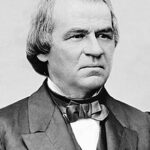President Andrew Johnson’s decision to fire Secretary of War Edwin Stanton violated the Tenure of Office Act. This act required Senate approval for removing cabinet members. Johnson deliberately defied Congress, creating a constitutional crisis during Reconstruction. ⚠️
The Tenure of Office Act Violation
On February 21, 1868, Johnson removed Stanton from office without Senate consent. The president believed the Tenure of Office Act was unconstitutional. He wanted to test its legality through the courts. Johnson appointed Lorenzo Thomas as interim Secretary of War. Congress viewed this as direct defiance of legislative authority.
Political Motivations Behind the Firing
Johnson clashed repeatedly with Stanton over Reconstruction policies. Stanton supported Radical Republican plans for the South. Johnson favored lenient treatment of former Confederate states. The secretary often worked against presidential directives. 📊 Johnson saw Stanton’s removal as essential for implementing his vision.
Congressional Response and Impeachment
The House of Representatives voted to impeach Johnson three days later. Eleven articles of impeachment were drafted against the president. Nine articles directly related to the Tenure of Office Act violation. Congress accused Johnson of exceeding executive authority. The constitutional showdown tested the balance of federal power. ⚖️
Impact:
Johnson’s violation of the Tenure of Office Act created lasting consequences for American government. The impeachment trial established important precedents for executive accountability. 🔥
Immediate Political Consequences
The Senate trial lasted from March to May 1868. Johnson survived removal by a single vote. Seven Republican senators broke party lines to acquit him. The narrow margin demonstrated deep political divisions. Johnson’s presidency was effectively crippled for his remaining months. He could not pursue major policy initiatives.
Constitutional Precedents Established
The crisis clarified the impeachment process for future generations. It established that political disagreements alone cannot justify removal. The trial demonstrated Congress’s power to check executive authority. However, it also showed the difficulty of removing presidents. The Tenure of Office Act was later declared unconstitutional by the Supreme Court. 📉
Long-term Effects on Presidential Power
Johnson’s actions weakened the presidency for decades afterward. Future presidents became more cautious about confronting Congress directly. The incident highlighted tensions between executive and legislative branches. It influenced how cabinet appointments and removals were handled. The crisis demonstrated the importance of constitutional checks and balances. Modern presidential scholars still study this pivotal moment in American democracy. 🌍
